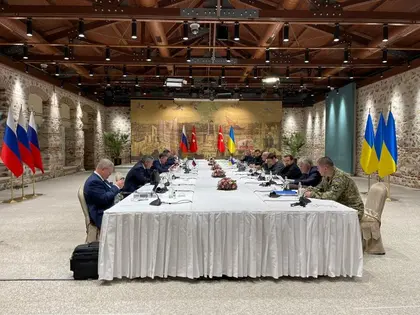Ukraine and Russia are set to sign a deal on July 22 to unblock grain exports and relieve a global food crisis, as a critical Russian gas pipeline to Europe reopened.
But there was no respite in the conflict on the ground, with Russian artillery on Thursday pounding Ukraine’s second largest city Kharkiv, already scarred by weeks of shelling.
JOIN US ON TELEGRAM
Follow our coverage of the war on the @Kyivpost_official.
UN Secretary-General Antonio Guterres was due to arrive in Turkey on Thursday for the grain deal signing ceremony at Istanbul’s lavish Dolmabahce Palace on the Bosphorus Strait.
President Recep Tayyip Erdogan’s spokesman Ibrahim Kalin tweeted that the agreement will be signed in Istanbul on Friday under the auspices of the Turkish leader, Guterres and Ukrainian and Russian delegations.
The first major agreement between the warring sides since Russia’s February invasion of its neighbour comes with global food prices soaring and people in some of the world’s poorest countries facing starvation.
The five-month war is being fought across one of Europe’s most fertile regions by two of the world’s biggest grain producers.
Up to 25 million tonnes of wheat and other grain have been blocked in Ukrainian ports by Russian warships and landmines Kyiv has laid to avert a feared amphibious assault.
Ukrainian foreign ministry spokesman Oleh Mykolenko told AFP that Kyiv’s delegation would only accept solutions that guarantee the security of its southern regions, the position of its forces in the Black Sea and the safe export of its agricultural products.

ISW Russian Offensive Campaign Assessment, January 22, 2025
The United States welcomed the deal but urged Russia to implement it in good faith.
“We should never have been in this position in the first place,” said State Department spokesman Ned Price, accusing Russia of “weaponising” food.
In more good news for global markets, Russia on Thursday restored critical gas supplies to Europe through Germany via the Nord Stream pipeline after 10 days of maintenance.
However, suspicion lingered that the Kremlin would trigger an energy crisis on the continent this winter. European Union states have accused Russia of squeezing supplies in retaliation for Western sanctions over the war.
Germany, which is heavily dependent on Russian gas, had feared that Moscow would not reopen the pipeline after the scheduled work and accused Moscow of using energy as a “weapon”.
The resumption of gas supplies came a day after the European Commission unveiled emergency measures to circumvent Russian energy “blackmail”.
Klaus Mueller, head of Germany’s energy regulator, said that by late morning gas flows were on track to return to 40 percent of the pipeline’s capacity — the same reduced level as before the maintenance work.
Despite efforts within the bloc to reduce dependence on Russian energy supplies, Moscow’s closest EU ally, Hungary, announced Thursday it was seeking to increase gas deliveries from Russia.
Foreign Minister Sergei Lavrov said Russia would “consider” Budapest’s request for more gas this year after his Hungarian counterpart Peter Szijjarto visited Moscow Thursday.
– ‘Stay in shelters!’ –
In Kharkiv, prosecutors said three people had been killed and 23 more injured in a Russian missile strike.
“The enemy is firing chaotically and brutally at the city. Stay in shelters!” regional governor Oleh Synehubov wrote on social media.
In Kramatorsk in the Donbas region of eastern Ukraine, which has seen some of the fiercest fighting, a school that Ukrainian officials said was being used as a food aid storage point was also struck.
Russian troops invaded Ukraine on February 24 and the war has left thousands dead, forced millions to flee their homes and raised fears of a nuclear disaster.
Moscow accused Ukrainian forces Thursday of having fired on Europe’s largest nuclear power plant, which is in Russian-controlled territory, and claimed a “catastrophe” was avoided “by luck”.
Ukraine — without responding to the allegations — said Russia was storing heavy weapons and ammunition at the Zaporizhzhia plant and that any accident there could lead to a crisis worse than the 1986 Chernobyl disaster.
Some 15,000 Russians have died in the invasion, the US and British spy chiefs said, as they assessed that President Vladimir Putin was suffering far greater losses than expected.
Richard Moore, the head of Britain’s MI6 intelligence service, said Thursday that the 15,000 dead was “probably a conservative estimate” and marked a “very bloody nose” for Putin, who had expected quick victory.
In an exclusive interview with AFP, Alexander Lukashenko, the strongman leader of Belarus and close Kremlin ally, meanwhile urged Moscow and Kyiv to relaunch negotiations to avoid a nuclear escalation.
“Further (ahead) lies the abyss of nuclear war. There’s no need to go there,” said the leader of Belarus, which was used by Russian troops in February as a launching pad to attack Ukraine.
– ‘Different’ war aims for Russia –
Western powers have stepped up arms supplies to Ukraine but President Volodymyr Zelensky has asked for more and speedier deliveries.
Britain became the latest country Thursday to announce it is re-upping military supplies with artillery, “hundreds of drones and hundreds more anti-tank weapons” for Ukraine in the coming weeks.
Russia has warned about arms supplies and said they mean Moscow will no longer be focused only on wresting control of the east Ukraine regions of Lugansk and Donetsk, which have been partially controlled by pro-Moscow rebels for years.
In its latest package of sanctions this week, the EU imposed an embargo on Russian gold imports and froze assets at Russia’s largest bank.
The bloc followed up Thursday with asset freezes and visa bans on 10 Syrians, accusing them of recruiting mercenaries to fight for Russia.
You can also highlight the text and press Ctrl + Enter










